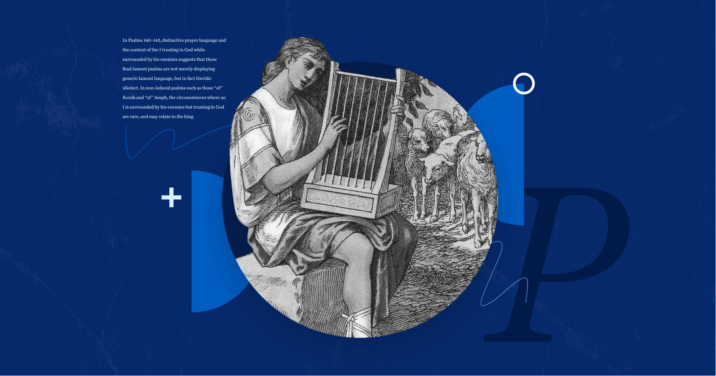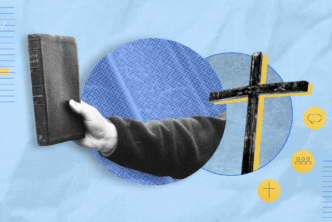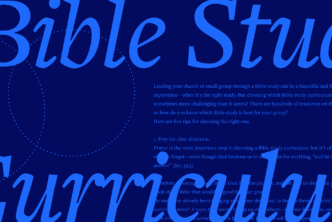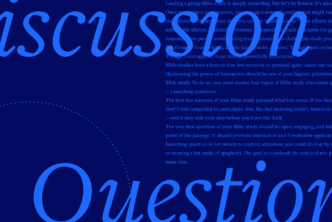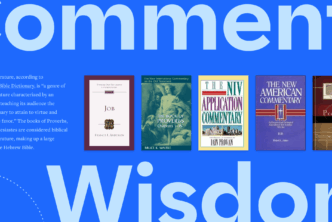How can Gollum, hyperlinks, and product placement help us to understand why there are lament psalms at the end of the Psalter?
A popular generalization about the Psalter is that it moves in a trajectory from lament to praise, and from psalms spoken in the voice of an individual (I) to that of a corporate body (we).1 However, the juxtaposition of four individual laments (Psalms 140–143) with the Final Hallel (Psalms 146–150) invites us to review the placement of laments in the Psalter. The significance of the Hebrew ledavid psalm headings (“of David,” “to David,” or “for David”) is debated, with some scholars claiming that the ledavid headings of Psalms 140–143 no longer signify the voice of the Davidic king but represent a generic Everyman or the voice of the nation.2
I offer three lines of argument for seeing Psalm 140–143 as compositions of a Davidic I and not a generic nor collectivized we—and for the theological and pastoral significance of the placement of individual laments at the end of the Psalter.
Gollum and the Davidic idiolect
Gollum’s voicing of “My Precioussss” exemplifies his distinctive way of speaking in The Hobbit and The Lord of the Rings, Fred Flintstone is easily recognized by his signature catchphrase, “Yabba-Dabba-Doo!,” and Yoda’s syntax, “Much to learn, you still have,” is so idiosyncratic that it has been dubbed “Yoda-speak.” Such distinctive ways of speech are called “idiolects.” Just as a dialect refers to the language of a community, an idiolect describes the speech of an individual that is distinctive or can be imitated.
Psalms 140–143 each have the Hebrew title ledavid (“of David,” “to David,” or “for David”), and systematic study reveals that phrases and vocabulary found distinctively in the ledavid psalms of Books I–III also occur in Psalms 140–143. These psalms are characterized by Davidic idiolect, an argument confirmed by the fact that these distinctive ledavid words and phrases are not found in psalms with other author titles such as “of the Sons of Korah,” “of Asaph,” and “of Solomon” (which I group as “non-ledavid” psalms) in Books I–III.
A small sample of instances of distinctive ledavid language in Psalms 140–143 include phrases used in prayer, David’s trust in God, and his circumstances of being surrounded by his enemies in these laments. None of these phrases are found in Books I–III outside the ledavid psalms.
David prays, “Answer me” (עניני) in Psalm 143:1 as he does in Psalm 4:2—and eight other times in ledavid psalms in Books I–III.3 He urges, “Answer me quickly” (מחר עניני) in Psalm 143:7 as in Psalm 69:18, and “Hasten to me” (חושׁה לי) in Psalm 141:1 as in Psalm 70:6. He affirms, “You are my God” (אלי אתה) in Psalm 140:7 as in Psalm 22:11 and “I trust in you” (בך בטחתי) in Psalm 143:8 as in Psalm 25:2.
The I is surrounded by danger from his enemies in Psalms 140–143. Distinctive descriptions include “my enemy/enemies” (אויבי), which occur twenty-three times in Books I–III in ledavid psalms (e.g., Pss 3:8) and in Psalm 143:9, 12. The I of Psalm 142:7 prays, “Save me from my persecutors (רדפי as in Ps 7:2), for they are too strong for me!” (כי אמצו ממני as in Ps 18:18). “Evildoers” (פעלי און) are found in Psalms 141:4, 9 and eight times in Books I–III in the ledavid psalms (e.g. Ps 5:6). The imagery of “traps” (פח), “nets” (רשׁת), and “snares” (מוקשׁ) occurs in Psalm 140:6 and in Psalms 11:6, 9:16, and 18.6, but not in non-ledavid psalms in Books I–III.
In Psalms 140–143, distinctive prayer language and the context of the I trusting in God while surrounded by his enemies suggests that these final lament psalms are not merely displaying generic lament language, but in fact Davidic idiolect. In non-ledavid psalms such as those “of” Korah and “of” Asaph, the circumstances where an I is surrounded by his enemies but trusting in God are rare, and may relate to the king.
Hyperlinks in the Psalter
“Click here.” In today’s world, hyperlinks allow us to connect from a current text to a text in another location, using a mouse click or a screen tap. A palimpsest is a more ancient way of linking texts, where a newer text on a parchment or papyrus is written over the top of an older text. In his book, Palimpsests, Gérard Genette uses the metaphor of a palimpsest to discuss connections between texts. He names the current text the hypertext, and the underlying text the hypotext.4 Genette describes two kinds of relationships between these two texts: the hypertext may imitate the hypotext, or it may transform it.5 Common transformations include those made in voice, genre, or mood.6
Some interpreters claim that after Psalm 89, David is transformed from a king to a symbol representing the nation. However, a different, and indeed opposite, narrative is suggested by transformations in voice between the non-ledavid psalms of Book III and Psalms 140–143. Comparing Psalms 140–143 with Book III, words and phrases from the non-ledavid psalms of Book III are frequently transformed in Psalms 140–143 from plural to singular, and from complaint to trust, bringing a renewed focus on David’s trust in God in circumstances of suffering and danger.
Where vocabulary from the non-ledavid psalms of Book III is found in Psalms 140–143, it is often transformed from a reference to the nation in the non-ledavid psalms of Book III into a reference to the I in Psalms 140–143. For example, the communal lament of Psalm 79:8 describes the tragedy of the destruction of the temple, “for we are brought very low” (כי דלונו מאד), but in Psalm 142:7, a very similar phrase is found in the Davidic individual lament, “for I am brought very low” (כי דלוני מאד). In Psalms 140–143, the individual I is clearly distinguished from a collective—groups described, for example, as “the needy” (אבינים) or “the righteous” (צדיקים) in Psalms 140:13–14 and 142:8.7
There is also transformation of genre or mood, such as from a complaint in the non-ledavid psalms of Book III to a prayer of trust in Psalms 140–143. For example, Psalm 89:40 claims that God has renounced his covenant with “your servant” (עבדך) and Psalm 89:50 questions, “where is your steadfast love (חסדך) of old, which in your faithfulness (באמונתיך) you swore to David?” Some see these verses as signalling the end of the Davidic covenant,8 but David’s prayer of trust in Psalm 143 uses these same terms, “in your faithfulness” (באמונתיך) 143:1, “your steadfast love” (חסדך) 143:8, and “your servant” (עבדך) 143:12. David’s dependence is a characteristic of the lament genre throughout the Psalter and does not signal a change in David’s status in Psalms 140–143.9
Product placement
In Sylvester Stallone’s famous supermarket scene in Cobra (1986), a large Pepsi display is given center-screen exposure for over ten seconds while Lieutenant Marion Cobretti (Stallone) prepares to negotiate with a gunman from “The New World” supremacist group, who have entrapped hostages.
The location of key information near the end of a written text is a form of product placement, and the location of Psalms 140–143 near the end of the Psalter merits our attention.
At the beginning of the Psalter, according to Rolf Rendtorff, Psalm 1 presents David as an exemplar of Torah piety, Psalm 2 presents David as an exemplar of royalty, and Psalm 3 presents David as an exemplar of suffering. Rendtorff proposes that each of these images is foregrounded at different points in Book I, while the other images are not erased, but temporarily moved to the background.10
At the end of the Psalter, surprisingly, the individual Davidic laments of Psalms 140–143 receive center-screen attention. We may have expected a conclusion focusing on David’s triumphs over his enemies as in Psalm 110 (like Psalm 2), or an emphasis on Torah piety as in Psalm 119 (like Psalm 1). However, our final picture of David is not of royal triumph over enemies, nor a celebration of Torah, but of a suffering David, surrounded by his enemies, yet trusting in God (like Psalm 3).11
I propose that Psalms 140–143 juxtapose the “now” of present suffering for believers with the “not yet” of the final coming of God’s kingdom in the Final Hallel (Psalms 146–150).12 In Psalms 140–143, David suffers and is in danger from enemies, while in the Final Hallel, the poor are satisfied, homes are secure, and all are called to joyfully praise God.
Conclusion
Psalms 140–143, standing at the end of the Psalter, bring a renewed focus on the suffering David through idiolect, hyperlinks, and product placement. David laments as in the ledavid psalms in Books I–III, and his lament is found on center screen at the end of the Psalter. The juxtaposition of Psalms 140–143 with the Final Hallel reminds us that lament is a reality until the kingdom comes in all its fulness. Anyone who is persecuted, grieving, homeless, in danger, friendless, or ill can lament with David as they await the incoming rule of God.
Related article
- How the Psalms of Lament Teach Us to Turn Our Complaints to God
- How to Use a Commentary to Study the Psalms
- See Claus Westermann, Praise and Lament in the Psalms, trans. K. Crim and R. N. Soulen (Atlanta: John Knox, 1981), 257. However, Villanueva demonstrated a movement from praise to lament in some psalms and Boda has shown a more complex arrangement of Book V. Federico G. Villanueva, The Uncertainty of a Hearing: A Study of the Sudden Change of Mood in the Psalms of Lament (Leiden: Brill, 2008); Mark. J. Boda, “‘Varied and Resplendid Riches’: Exploring the Breadth and Depth of Worship in the Psalter,” in Rediscovering Worship: Past, Present, Future, ed. W. J. Porter. McMaster New Testament Series. (Eugene, OR: Wipf & Stock, 2015), 61–82.
- Gerald Wilson, The Editing of the Hebrew Psalter (Chico, Scholars Press, 1985), 228; Martin Leuenberger, Konzeptionen des Köningtums Gottes im Psalter: Untersuchungen zu Komposition und Redaktion der theokratischen Bücher IV–V im Psalter, ATANT 83 (Zürich: Theologischer, 2004), 384 n364.
- Hebrew verse numbers are used.
- Gérard Genette, Palimpsests: Literature in the Second Degree, trans. C. Newman and C. Doubinsky (Lincoln: University of Nebraska Press, 1997), 5.
- Genette, Palimpsests, 7.
- See Genette, Palimpsests, 83, 28.
- See also Jill Firth, ‘The Suffering Servant in Book V of the Psalter,’ in Reading the Psalms Theologically, edited by David M. Howard Jr. and Andrew Schmutzer (Lexham Press, 2023).
- Wilson, Editing, 213.
- Amy C. Cottrill, Language, Power, and Identity in the Lament Psalms of the Individual, LHBOTS 493 (New York: T&T Clark, 2008), 117.
- Rolf Rendtorff, “The Psalms of David: David in the Psalms,” in The Book of Psalms: Composition and Reception, ed. P. W. Flint and P. D. Miller Jr. (Leiden: Brill, 2005), 63, 56.
- My research also examines Psalms 138–139 and 144–145, but these are not discussed here. David’s danger from his enemies is mentioned in Pss 138:7; 139:19; 144:7; 145:19–20.
- The order of the Psalter is the same in MT, LXX, and Peshitta, but there is some variation in the DSS. For a discussion, see Eva Mroczek, “The Mirage of the Bible: The Case of the Book of Psalms,” in The Literary Imagination in Jewish Antiquity (New York: OUP, 2016), 19–45; David Willgren, The Formation of the “Book” of Psalms: Reconsidering the Transmission and Canonization of Psalmody in Light of Material Culture and the Poetics of Anthologies, FAT (Tübingen: Mohr Siebeck, 2016); and Drew Longacre, “The 11Q5 Psalter as a Scribal Product: Standing at the Nexus of Textual Development, Editorial Processes, and Manuscript Production.” Zeitschrift für die alttestamentliche Wissenschaft 134.1 (2022): 85–111.

